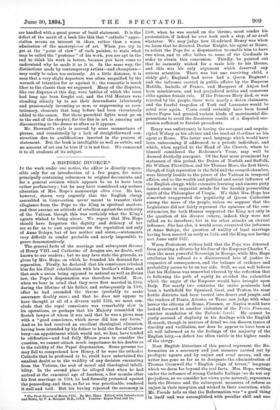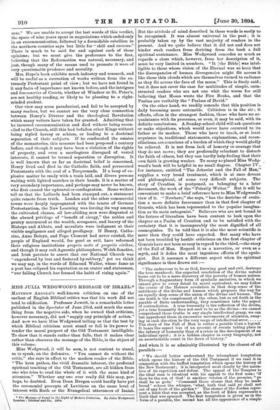A HISTORIC DIVORCE.*
Ix the work under our notice, the editor is directly respon- sible only for an introduction of a few pages, for notes principally containing references to original documents, and for a general revision which appears to us to have been rather perfunctory ; but he may have considered any serious alteration of Mrs. Hope's manuscript ultra vires. He has, however, shown very cogently that the English clergy assembled in Convocation never meant to transfer their allegiance from the Pope to the King in spiritual matters, and thus assume an attitude of rebellion against the authority of the Vatican, though this was certainly what the King's agents wished to bring about. We regret that Mrs. Hope should have forgotten the dignity and delicacy of her sex so far as to cast aspersions on the reputation not only of Anne Boleyn, but of her mother and sister,—statements very difficult to render probable and nearly impossible to prove demonstratively.
The general facts of the marriage and subsequent divorce of Henry VIII. and Catherine of Aragon are, no doubt, well known to our readers ; but we may here state the grounds, as given by Mrs. Hope, on which he founded his demand for a separation. Firstly, he declared that his conscience rebuked him for his illicit cohabitation with his brother's widow, and that such a union being opposed to natural as well as divine law, the Pope's dispensation was therefore invalid. Now, when we bear in mind that they were first married in 1504, during the lifetime of his father, and subsequently in 1509, after he had ascended the throne (probably to make assurance doubly sure), and that he does not appear to have thought at all of a divorce until 1524, we must con- clude that the royal conscience was remarkably slow in its operations, or perhaps that his Majesty resembled the Scotch lawyer of whom it was said that he was a pions man with a "good conscience, which never did him any harm." And as he had received an excellent theological education, having been intended by his father to hold the See of Canter- bury—an appointment which would not, we fear, have tended to edification—and had fully fifteen years to consider the -question, we cannot attach much importance to his doubts as to the validity of the Papal dispensation. Some persons too may fail to comprehend how Henry, if he were the orthodox Catholic that he professed to be, could have entertained the smallest doubt as to the validity of any decision emanating from the Vatican, the seat of moral and theological infalli- bility. In the second place he alleged that when he had arrived at the canonical age of fourteen, a few months after his first marriage in 1504, he had formally protested against the proceeding, and thus, as far as was practicable, rendered it null and void. But his having repeated the ceremony in
• The First Divorce of Henry VIII. By Hrs. Hope. Edited, with Introduction and Notes, by F. A. Gasquet D.D., 0.8.B. London : Regan Paul and 0o.
1509, when he was seated on the throne, must render his protestation, if indeed he ever took such a step, of no avail whatever. We may judge how ill-advised Henry was when we learn that he directed Doctor Knight, his agent at Rome, to solicit the Pope for a dispensation to enable him to have two wives, and to offer bribes to some of the Cardinals in order to obtain this concession. Thirdly, he pointed out that he earnestly wished for a male heir to his throne, and this was his only argument which deserved any serious attention. There was bat one surviving child, a sickly girl; England had never had a Queen Regnant ; and the influence exerted in public affairs by the Empress Matilda, Isabella of France, and Margaret of Anjou had been mischievous, and had prejudiced nobles and commons alike against female rule. If the Princess Mary died, or was rejected by the people, there were nearly a dozen claimants, and the fearful tragedies of York and Lancaster would be acted over again. Cases could certainly have been found where Popes had granted various kinds of matrimonial dis- pensations to avoid the disastrous results of a disputed suc- cession sufficient to furnish precedents.
Henry was unfortunate in having the arrogant and unprin- cipled Wolsey as his adviser and the insolent Gardiner as his agent at Rome. The latter used language which would have been unbecoming if addressed to a private individual, and which, when applied to the Head of the Church, whom he himself considered the Redeemer's Vicar, may well be deemed decidedly arrogant. Of the four most prominent-lay statesmen of this period, the Dukes of Norfolk and Suffolk, Sir William Fitz william and Sir Thomas More, the first three, though of high reputation in the field and the council-chamber, were bitterly hostile to the power of the Vatican in temporal affairs, and to the wealth and political and social influence of the English clergy, while extensive learning and sincere piety cannot atone in impartial minds for the harshly persecuting spirit of the Philosopher of Utopia. We think Mrs. Hope has somewhat exaggerated the popularity of Queen Catherine among the mass of the people, unless we suppose that the Legislature did not fairly represent the opinions of the con- stituencies, for both Houses supported the King not only in the question of his divorce (where, indeed, they were not called on to interfere), but in his other attacks on clerical influence. She has also, it would seem, overrated the influence of Anne Boleyn, the question of nullity of legal marriage having been mooted as early as 1524, and the King not having met Anne until 1527.
Warm Protestant writers hold that the Pope was deterred from granting a divorce by his fear of the Emperor Charles V., then the most powerful Sovereign in Europe, while Mrs. Hope attributes his refusal to a disinterested love of justice ir- respective of consequences, and the balance of evidence and probability seems to be on her side. Still, we can well believe that his Holiness was somewhat cheered by the reflection that in following the path of equity he avoided the calamities which the anger of the Emperor would have brought upon Italy. For nearly two centuries the entire peninsula had been a battlefield for Spaniard, Gaul, and Teuton, its most fertile districts had been turned into desert and jungle, and the readers of Dante, Ariosto, or Tasso can judge with what horror the citizens of Rome, Florence, or Naples would have looked forward to another visitation of the Furia Francese, another inundation of the Tedeschi lurchi. He cannot be justly accused of duplicity in his dealings with the English Monarch, though in matters of detail we can discern traces of timidity and vacillation, nor does he appear to have been at all well informed as to the feelings of the majority of the English laity,—a defect too often visible in the higher ranks of the clergy.
Most English historians of this period represent the Re- formation as a necessary and just measure carried out by profligate agents and by unjust and cruel means, and one writer has gone so far as to designate the administration of Thomas Cromwell the " English reign of terror," language which we deem far beyond the real facts. Mrs. Hope, writing under the influence of strong Catholic feelings (we do not say prejudices, as we consider her views quite natural), represents both the Divorce and the subsequent measures of reform as unjust in their inception and wicked in their execution, while Mr. Fronde tells us that the Reformation was " a good thing in itself and was accomplished with peculiar skill and sac-
cm." We are unable to accept the last words of this verdict, the space of nine years spent in negociations which ended only in an excommunication, followed by a formidable rebellion in the northern counties says but little for " skill and success." There is much to be said for and against each of these opinions; but we must give the preference to the first, believing that the Reformation was natural, necessary, and just, though many of the means used to promote it were of very questionable prudence and morality.
Mrs. Hope's book exhibits much industry and research, and will be useful as a correction of works written from the ex- tremely Protestant point of view ; but we have not found in it any facts of importance not known before, and the intrigues and tracasseries of Courts, whether of Windsor or St. Peter's, are not healthy reading, or likely to be pleasing to a right- minded student.
Our view may seem paradoxical, and fail to be accepted by many readers, but we cannot see the very close connection between Henry's Divorce and the theological Revolution which many writers have taken for granted. Admitting that he incurred excommunication and died without being recon- ciled to the Church, still this had befallen other Kings without being styled heresy or schism, or leading to a doctrinal separation of their subjects. If he confiscated the estates of the monasteries, this measure had been proposed a century before, and though it may have been a violation of the rights of property, and even a sacrilegious disregard of vested interests, it cannot be termed separation or disruption. It is well known that as far as doctrinal belief is concerned, Henry lived and died in the Catholic faith, and persecuted Protestants with the zeal of a Torquemada. If a heap of ex- plosive matter be ready with a train laid, and divers persons waiting with lighted matches in their hands, it is a matter of very secondary importance, and perhaps may never be known, who first caused the upheaval or conflagration. Some writers tell us that the Lollards had been stamped out, a statement quite remote from truth. London and the other commercial towns were deeply impregnated with the tenets of German Protestantism, the New Learning was forcing its way among the cultivated classes, all law-abiding men were disgusted at the absurd privilege of " benefit of clergy," the nobles and gentry murmured at the wealth, arrogance, and luxury of the Bishops and Abbots, and moralists were indignant at their visible negligence and. alleged profligacy. If Henry, Cathe- rine, Anne Boleyn, and Pope Clement had never existed, the people of England would, for good or evil, have reformed their religious institutions proprio motu et propriis virib us, and though it may suit Agnostic philosophers, Welsh fanatics, and Irish patriots to assert that our National Church was "engendered by lust and fostered by robbery," yet we think we may say, in the words of Edmund Waller, whose fame as a poet has eclipsed his reputation as an orator and statesman, "our falling Church has formed the habit of rising again."



















































 Previous page
Previous page